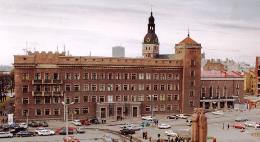
| Education System in Latvia |
Latvian education is compulsory and free for children between ages 5 and 18. The first 9 years are spent panatskola primary schools that provide a basic academic education.
For the final three years of their schooling, academically-minded pupils may continue on to general secondary schools where they complete their university preparation by sitting for their certificate of general secondary education. Those with a more practical view on life choose vocational secondary schools instead, that culminate in certificates of vocational education.
Latvia has introduced a strategy of continuous vocational training which embraces the concept of life-long learning in order for everybody to remain up-to-date in job-related knowledge. It is hoped that soon half a million people will be participating in these paid programs every year.
 There are 34 state-recognized higher education institutions, including colleges that offer programs of 2 to 3 year’s duration, and universities offering academic training leading to bachelor’s and master’s degrees.
There are 34 state-recognized higher education institutions, including colleges that offer programs of 2 to 3 year’s duration, and universities offering academic training leading to bachelor’s and master’s degrees.
The oldest of these is Riga Technical University founded in 1862 and previously known as Riga Polytechnicum. In additional to a flourishing business school, it has faculties of Architecture & Urban Planning, Building & Civil Engineering, Computer Science & Information Technology, Electronics & Telecommunications, Engineering Economics, Materials Science & Applied Chemistry, Power & Electrical Engineering, and finally Transport & Mechanical Engineering.